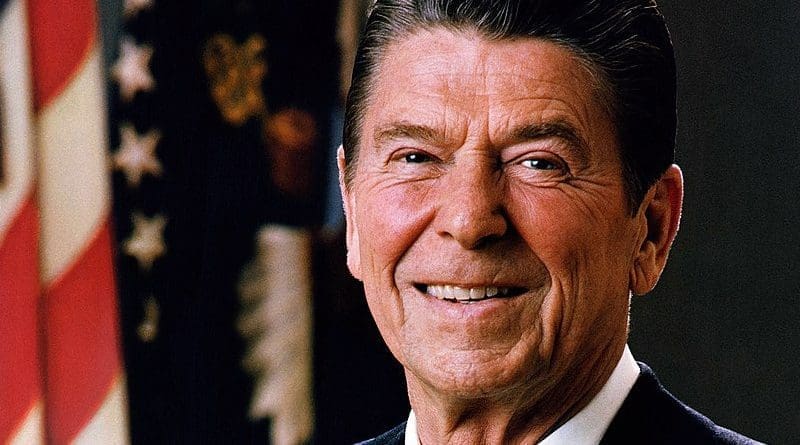Did Reagan Win The Cold War?
By Ivan Eland
My visit to the Reagan Ranch in the mountains near Santa Barbara, Calif., on the 100th anniversary of Ronald Reagan’s birth on Feb. 6, 1911, and today’s revolutions sweeping the Arab world got me thinking about how much Reagan actually had to do with his alleged signature achievement—winning the Cold War.
Conservatives would have us believe that Reagan’s inflammatory rhetoric, increases in defense spending, and “Star Wars” missile defense shield made the Soviet Union’s top echelons quake in their boots, tear down the Berlin Wall, close up shop, and go home. They even quote Soviet generals as saying U.S. defense spending hikes had a substantial effect on the collapse of the Soviet Empire.
Yet during the Cold War when U.S. generals at the Pentagon were asked about the Soviet military, they always claimed it was 10-feet tall in order to get more money for U.S. forces. Soon they started believing this yarn themselves. The Soviet generals undoubtedly drank similar, but red, Kool-Aid. And generals rarely know anything about economics or larger social forces.
As for U.S. defense spending, it had been quite high historically ever since the Cold War began, and Jimmy Carter was increasing it even before Reagan took office. Conservatives sometimes argue that Reagan’s defense funding hikes drove the Soviets to select Mikhail Gorbachev, whose reforms collapsed the Soviet Empire and then the Soviet Union. Of course, this is a major concession because this admits that the major causal factor for the collapse was an internal one. Reagan may have doubled the U.S. defense budget in eight years, but he only had four years of increases until Gorbachev took power in 1985. In reality, Gorbachev took power only after the Soviets turned to a younger leader after three older leaders died in rapid succession. The far-fetched notion that Star Wars led to Soviet bankruptcy is belied by Gorbachev’s accurate statement that he could build offensive missiles to counter missile defense faster and more cheaply than the U.S. could build those defenses, and by the absence of any panicked Soviet effort to to do so.
What the impotence of the lone U.S. superpower in the wake of revolutions sweeping the Arab world says about the Soviet collapse is that the biggest factors driving revolutions are usually internal. President Harry S. Truman was blamed for “losing China” in 1949, and weak U.S.-led international economic sanctions were credited with toppling the South African apartheid regime. In both cases, the potential for U.S. and international influence was significantly overstated and factors internal to the subject countries were vastly underrated. The U.S. has trouble getting even militarily-installed puppet governments, such as those in Iraq and Afghanistan, to do its bidding. If the U.S. government has trouble effecting desired outcomes in such lesser powers, why do conservatives assume that its smoke and mirrors could have toppled an opposing superpower?
Incredibly, conservatives ask us to believe that Ronald Reagan, with only harsh rhetoric and some extra dollars for defense, tore apart the Soviet Empire. More than likely, it was the non-viability of the grossly inefficient Soviet economic system, exacerbated by the plummeting price in the 1980s of the Soviets’ major export (oil), that led to the collapse. Ronald Reagan’s defense spending increases might have had a marginal effect, but mainly he was lucky to have been president just before the Soviet house of cards fell in.


Lucky? Really? OK. That’s an interesting take.
Certainly there were a lot of forces (Thatcher, the Pope, Solidarity, stinger missles in Afghanistan, Gorbachev’s reforms) that caused the Soviet Union to crack but it was Reagan’s moral, rhetorical, and military campaign was the driving force.
If you don’t want to give him any credit (seriously nothing at all?), I’m sure Ronnie wouldn’t mind. He was focused on the millions of humans who lived, as prisoners, behind the iron curtain.
There was a plaque on Reagan’s desk that read
“There is no limit to what a man can do or where he can go if he doesn’t mind who gets the credit.”